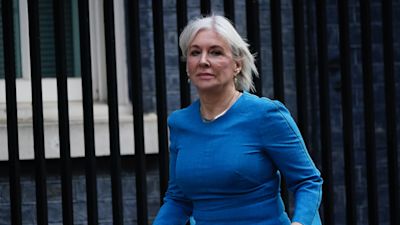'Unfair' to ask women to compete against athletes 'biologically born male', Nadine Dorries says

Culture Secretary Nadine Dorries has said "asking women and teenage girls" to compete against athletes "biologically born a male is inherently unfair".
Ms Dorries said she wanted to make it "absolutely clear" that domestic sports groups should follow the example of swimming's governing body FINA and impose regulations on the participation of trans women athletes.
She said the issue has been "ducked for too long", adding: "We can’t pretend that sex doesn’t have a direct impact on a person’s athletic performance."
The Cabinet minister has been vocal over her belief that women's sport should only be accessible for people "born of the female sex".
She wants a uniform policy to be adopted by the majority of sports groups and governing bodies.
Currently, most sports groups at both national and international level allow trans women athletes to compete if their testosterone level has been reduced over a 12-month period.
"I expect sporting bodies to follow the policy that competitive women’s sport must be reserved for people born of the female sex," Ms Dorries said in a tweet.
"We need to do this in a way that protects and shows compassion to all athletes – including the creation of open categories. But fairness in competitive sport has to take priority above all else," she added.
Controversy was previously sparked when trans cyclist Emily Bridges accused cycling's world governing body - the UCI - of a "last minute moving of the goalposts" after it announced changes to its inclusion policy.
Bridges learnt about the new rule, which comes into effect on July 1, through the media which her family says has created “a significant amount of distress and upset" for her.
The UCI cited new research for their sudden change of policy, which will now require trans athletes to reduce their testosterone levels to even lower levels and for a longer period of time: two years now, rather than one.
The announcement from FINA, swimming's governing body, to ban trans women athletes who had gone through male puberty from competing in women's events, represented another massive shift in attitudes towards trans women athletes.
The move was backed by the culture secretary and soon followed by the women's international rugby league.
World Athletics has been tipped to follow suit and adopt new restrictions on trans women athletes.
Want a quick and expert briefing on the biggest news stories? Listen to our latest podcasts to find out What You Need To Know...